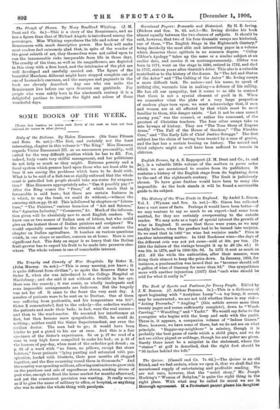Occasional Papers: Dramatic and Historical. By H. B. Irving. (Bickers
and Son. 3s. 6d. net.)—Mr. Irving divides his book almost equally between the two classes of subjects. It should be said, however,- that two of his four dramatic essays are historical, one of them, "The English Stage in the Eighteenth Century7 being decidedly the most able and interesting paper in a volume which deserves these epithets in no common degree. "Colley Cibber's Apology" takes up the same or a similar subject at an earlier date, and carries it on contemporaneously. Cibber was born in 1671, went on the stage in 1690, retired in 1732, and died in 1757, sixteen years after Garrick's debut. This also is a valuable contribution to the history of the drama. In "The Art and Status of the Actor" and "The Calling of the Actor" Mr. Irving essays a more difficult task. He makes—and his name, to speak of nothing else, warrants him in making—a defence of his calling. He has all our sympathy, but it seems to us idle to contend that there is not a special element of peril in it. When we remember what the plots of a very large proportion of modern plays turn upon, we must acknowledge that, if men and women are at all affected by that which must be most familiar to them, this danger exists. "Let it not be once uamel among you," was the counsel, or rather the command, of the greatest of Christian teachers. The four other essays take us into byways of history. They are "The True Story of Eugene Aram," "The Fall of the House of Goodere," "The Thnkler Case," and "The Early Life of Chief Justice Scroggs." The first subject has the claim of having been treated by a man of genius, and the last has a certain bearing on history. The second and third subjects might as well have been suffered to remain in oblivion.






























































 Previous page
Previous page